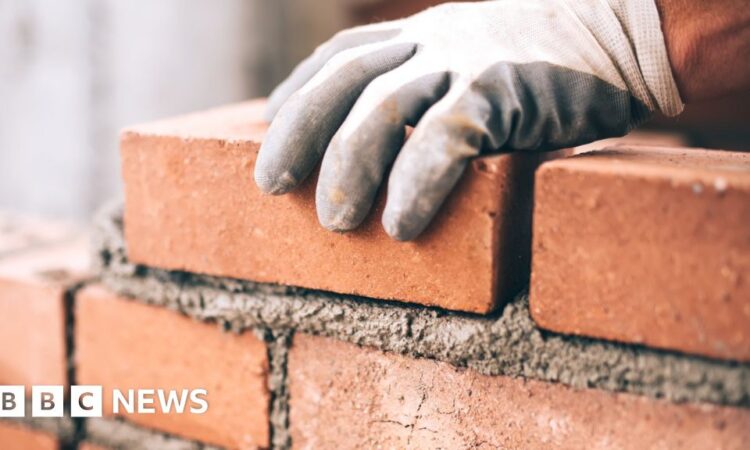
- By Michael Race & Jemma Dempsey
- Business reporters, BBC News
Image source, Getty Images
Concerns over construction standards have led to buyers being “put off” new-builds, a report says.
More than half of people surveyed for the Chartered Institute of Building (CIOB) think older houses are better than new-builds.
The institute said there was a “lack of trust in housebuilders” currently, despite the quality improving in recent years.
Housebuilders also said most homes were built to a “very high standard”.
But the National Federation of Builders trade association admitted some “undeniable failures by some high-profile companies” had harmed perceptions, though added it “hasn’t impacted the sales of the best builders”.
The UK has had a shortage of housing for many years, which has led to property prices soaring over the decades as demand has risen.
But when it comes to more new homes being built, the CIOB said housebuilders needed to “do more to demonstrate quality to potential buyers” to change negative perceptions.
In the survey it commissioned of 2,000 adults, it was found some 55% believed older homes were better quality than new-builds, compared to 21% who thought new-builds were better. Almost a third (32%) described new-build housing as “poor quality”.
Its also found 33% of respondents had a “low level of trust” of housebuilders building new homes to a high standard.
“Our research shows the majority view of new-build homes is that they’re of low quality and this puts many people off from considering buying one,” said David Parry, author of the CIOB’s report.
“However, the reality is that quality has improved,” he added, highlighting the fact that new builds are much more energy efficient than older homes and must adhere to more stringent regulations.
He said his report was designed to provide reassurance that the majority of housebuilders “are signed up to a very clearly defined and high set of standards”.
Do you think older houses are better than new ones? Please share your experiences by emailing haveyoursay@bbc.co.uk.
‘My worst nightmare’
Diane Jackson paid £315,000 for her new four-bedroom, detached house in Darwen, Lancashire, in April. But 10 days after getting the keys, she discovered damp along with a bug infestation.
The 61-year-old says she has not been able to move into the property and is having to pay the mortgage as well as rent on her current home.
She told the BBC that she paid for four independent reports into her home. They found problems with cavity walls as well as “plaster beetle”, which occurs in damp conditions.
Image source, Diane Jackson
Diane Jackson found plaster beetle in her new home
Ms Jackson said the developer Applethwaite Homes paid £2,700 to have a heat treatment on the property, which she said did not work and was still waiting for problems to be fixed.
She said she would “hate for anyone else to have to go through what I’ve been through”.
“I wanted to show my family my new home and be proud. Instead I’m embarrassed. They’ve (the developers) treated us so unfairly. It’s been my worst nightmare,” she added.
A spokesperson for Applethwaite Homes did not comment on Ms Jackson’s claims about the state of her home, but said it took “great pride in creating high-quality homes”.
“We go out of our way to meet our customers’ expectations and help them settle into their new homes,” they said.
Snagging checks
Snagging inspector John Cooper, managing director of New Home Quality Control, said he believed people’s views of the quality of new homes was “100% worse” than what the CIOB’s survey suggested.
He said his team across the UK spoke to 350 customers a month and “everyone is not happy”.
Mr Cooper, a former carpenter, set up his snagging inspection company with a fellow tradesman six years ago after “seeing so much bad work” on building sites. He has since generated a large following on social media where he highlights snags on new properties.
He told the BBC that the education and numbers of tradesmen and women needed to be improved to raise the standards of new-build homes.
Image source, John Cooper
Snagging inspector John Cooper says the standards of new-build homes needs to be raised
Mr Cooper added that although some well-known developers had started working with snagging inspectors, new homes should have inspections done by independent companies “throughout the build” in order to “iron out issues closer to completion”, rather than once the homebuyer has the keys.
“We find a lot of walls out of plumb every day. These issues should be identified at an earlier stage,” he said.
But the Home Builders Federation, which says its member companies build more than 80% of all new homes each year, said its surveys showed that the “overwhelming majority of people actually buying new-builds are happy with their new home”.
“Recent years has seen a huge focus on build quality in the house building industry and evidence shows we are delivering ever more high quality, environmentally friendly homes,” a spokesman said.
The National Federation of Builders, which represents developers, said that while there were failures by some firms, a “perverse situation” had been created “where rather than exploring how we keep standards high, many, especially MPs, only focus on the bad and look to reinvent the process”.
The trade body added that builders also faced “new, costly and unfair regulation, extra taxes to fix others failures”, which made business difficult.
But the government said legislation gave the housebuilding industry “a clear framework to deliver more, higher quality and safer homes”.
A spokesperson for the Department for Levelling Up, Housing and Communities said the New Homes Ombudsman was created to help customers “resolve issues which the developer has previously been unable or unwilling to fix”.
In 2021, the government also created an independent body to ensure standards were met by housebuilders called the New Homes Quality Board, but registration is not required by law.
